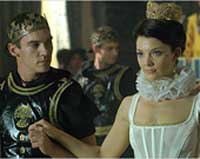Last year was an image-changing year for the Showtime cable network in its battle to emerge from the shadow of HBO. Dexter, more brilliant than ever. Californication, audaciously enjoyable. Meadowlands, quirky and unpredictable. Weeds, always a delight, with its best guest-star list ever. The L Word, dark but strong. And, oh yes, The Tudors.
The first season of The Tudors got the king's share of the attention, but in my mind didn't deserve it. For every solid scene of court intrigue and political maneuvering, there were two that seemed ripped from the covers of Harlequin romance novels. And while both the court and the church were filled with ambitious alpha males, only the female characters had much resonance or made much impact. Maria Doyle Kennedy, as King Henry VIII's out-of-favor first wife, and Natalie Dormer as kingly obsession Anne Boleyn, outshone everyone else on screen including Jonathan Rhys Meyers as the King.
The sole exception was Sam Neill's Cardinal Wolsey, but his character died last season. Historically, Wolsey died in route from his exiled home to the palace. In The Tudors, he died by his own hand -- a rather outrageous stretch by series creator-writer Michael Hirst, who has shuffled the biographies of royal sisters and even the timing of papal reigns to suit his dramatic purposes. Some might say that having a Catholic cardinal commit suicide is a betrayal of that character's religious character. In fact, I just did.

Beginning Sunday night at 9 ET, The Tudors is back for season two, and I'm happy to report it's better than season one. The Reformation gives it a very strong plot focus, Anne Boleyn and the King both seem to get what they want (but only temporarily), and the addition of Peter O'Toole as newly appointed Pope Paul III, while he appears infrequently, adds both cachet and gravity. And again, in the four episodes previewed, both Dormer and Kennedy outshine and out-act anyone else with whom they share the screen.
But The Tudors, as written and staged, pales when compared to HBO's John Adams. The casual rewriting of history is too heavy-handed, the exposition too clumsy, the pace too uneven. Still, The Tudors is watchable, and its primary value may be its sumptuous production values. The show looks great in promos -- and getting attention, right now, is a big part of Showtime's game.

The same attention-getting benefit applies to Tracey Ullman's State of the Union, a new series (Sunday night at 10 p.m ET) in which the incomparably chameleonic comedienne plays dozens of roles -- some fictional, others caricatures of actual people, from Renee Zellweger and Andy Rooney to Tony Sirico and David Beckham. Ullman plays them all, and plays them all with a commitment and lack of inhibition that is something to see.
The series itself, however, is built around a framework so loose (a look at a single day in the life of the country, tied to a fact or theme and seen through the eyes of dozens of characters, all played by Ullman), it doesn't support itself. An SCTV-type device, giving her freedom to play anyone and anything across the TV dial, might have been stronger. But though the parts don't add up to a coherent whole, the parts -- as played by Ullman -- are entertaining anyway.
For Showtime, these two series get high marks for showmanship and ambition, but aren't quite up to the highest of standards that Showtime itself has set with such other efforts as Dexter. That's the bad news, perhaps. But for Showtime, in the long run, it's also the good news.
Showtime, in 2008, is competing not with HBO, but with itself.